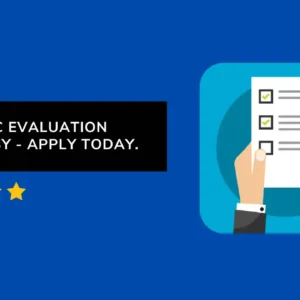At EEE OF AMERICA, we specialize in providing expert opinion letters that can support your immigration applications, RFE responses, and help you meet your goals. Our services extend to immigration lawyers, corporate legal departments, educational institutions, HR professionals, and individuals.
What is an Expert Opinion Letter?
An expert opinion letter is a document written by a university professor or a distinguished industry figure to provide an authoritative opinion on a specific topic. It’s commonly required for extraordinary ability petitions, responses to Requests for Evidence (RFEs), or cases that demand an expert’s point of view.
Our expert opinion letters are designed to satisfy USCIS requirements for H1B visas. They offer a document-to-document evaluation, providing a written opinion from a university professor in the relevant field, typically requiring a bachelor’s degree equivalent.
Our letters are based on rigorous analysis and include academic transcripts, employment verification letters, offer letters, resumes, and detailed job descriptions. If you need a translation of your transcripts, we are more than prepared to help.
Expert Opinion Specialty Areas
International Evaluations is equipped to assist immigration clients by referring to university professors and industry experts. These experts provide support for H1B petitions to USCIS. The USCIS determines foreign educational degree equivalencies and professional experience, extraordinary ability (O-1 and EB-1), establishes “specialty occupation” or industry standards for professional positions, and responds to PERM audits, among other things.
Our experts have written expert opinion letters for a wide range of academic degree fields approved by USCIS. These include:
- Business Fields: Accounting, Business Administration, Finance, Management, Marketing, etc.
- Computer and Information Technology Fields: Computer Science, Information Systems, Management Information Systems, etc.
- Engineering/Technology Fields: Automotive, Chemical, Construction, Electrical, Industrial, Manufacturing, Materials, Mechanical, Systems, etc.
- Humanities/Arts Fields: Communication, Dance, Education, English, Fashion Design, Film/Digital Media, Fine Arts, Graphic Design, Interior Design, Journalism, Literature, Music, Technical Writing, Theatre, Urban Planning, etc.
- Science Fields: Actuarial Science, Biochemistry, Biotechnology, Exercise Sciences, Food Sciences, Health Sciences, Physics, Quantitative Analysis, etc.
- Service Fields: Hospitality Management, Human Resources, Nursing, Public Administration, Public Health, etc.
Expert Opinion Letter for RFE (H1B)
At International Evaluations, we use a specific approach to respond to the H1B Specialty Occupation RFE. Our objective is to provide clear instructions to help understand the content and context. Below is a basic outline of what an Expert Opinion Letter for H1B contains:
- Header: This includes the expert’s credentials, the purpose of the letter, and the date.
- Overview: A general summary of the letter along with the expert’s findings.
- Expert’s Credentials: A detailed explanation of the expert’s qualifications and experience.
- Company Overview: The expert should have a thorough understanding of the company and how the responsibilities align with the company’s objectives.
- Job Position Duties: A list of job responsibilities along with an explanation of how the position meets specialty occupation requirements.
- Beneficiary’s Qualifications: A detailed account of the beneficiary’s academic and professional background.
The expert will then provide a comprehensive analysis explaining why the job position meets specialty occupation requirements. This includes explaining why the responsibilities are so specialized that they would require the attainment of a bachelor’s degree or above. Sometimes, the report includes the beneficiary’s background and qualifications if the USCIS asked for it.
Expert Opinion Letter for O1A/O1B
An Expert Opinion Letter for an O1A or O1B visa is a crucial component of the visa application process. This letter should be written by an expert in the applicant’s field who can attest to their extraordinary abilities or achievements.
Here’s a general structure and key points to include in such a letter:
- Introduction: Begin with a formal salutation and introduce yourself. Clearly state your qualifications and expertise in the field relevant to the applicant’s visa category (O1A for individuals with extraordinary ability in sciences, education, business, or athletics, and O1B for individuals with extraordinary ability in the arts or extraordinary achievement in motion picture or television industry).
- Connection to the Applicant: Explain how you know the applicant, whether through collaboration, mentorship, professional association, or other means. Provide details about the nature and duration of your relationship to establish your credibility in evaluating the applicant’s abilities.
- Assessment of Extraordinary Ability/Achievement: Evaluate the applicant’s accomplishments, skills, and contributions within their field. Provide specific examples or instances where the applicant has demonstrated extraordinary ability or achievement. Highlight any awards, publications, patents, exhibitions, performances, or other notable achievements that support their case.
- Comparison to Peers: Contrast the applicant’s achievements with those of their peers or others in their field. Explain why the applicant stands out as exceptional or extraordinary, emphasizing any unique qualities or accomplishments that distinguish them from others.
- Impact and Significance: Discuss the impact of the applicant’s work or contributions on their field, industry, or community. Describe how their achievements have advanced knowledge, innovation, or artistic expression, and why they are considered a leader or influencer in their field.
- Future Contributions: Provide insights into the applicant’s potential for future success and contributions. Discuss any ongoing projects, collaborations, or initiatives that indicate continued growth and impact in their field.
- Conclusion: Summarize your assessment of the applicant’s extraordinary abilities or achievements and express your support for their O1 visa application. Offer to provide further assistance or clarification if needed.
- Contact Information: Include your full name, professional title, organization or affiliation, contact information, and signature to authenticate the letter.
It’s essential to tailor the letter to the specific requirements and criteria outlined by the U.S. Citizenship and Immigration Services (USCIS) for the O1 visa category. Providing detailed and compelling evidence of the applicant’s extraordinary abilities or achievements will strengthen their visa application.
Expert Opinion Letter for EB2 NIW petitions
An Expert Opinion Letter for an EB2 National Interest Waiver (NIW) petition is a critical component of the application, providing an independent assessment of the applicant’s qualifications and the significance of their work to the national interest of the United States. Here’s a suggested structure and key points to include in such a letter:
- Introduction: Begin with a formal salutation and introduce yourself. Clearly state your qualifications and expertise in the field relevant to the applicant’s work and the national interest waiver criteria.
- Connection to the Applicant: Explain how you know the applicant, whether through collaboration, mentorship, professional association, or other means. Provide details about the nature and duration of your relationship to establish your credibility in evaluating the applicant’s qualifications and contributions.
- Assessment of Applicant’s Work: Evaluate the applicant’s work, research, or contributions within their field. Provide specific examples or instances where the applicant has demonstrated exceptional skill, innovation, or expertise. Highlight any publications, patents, presentations, awards, or other notable achievements that support their case.
- Significance to the National Interest: Discuss how the applicant’s work directly addresses the national interest of the United States. Explain the broader implications and benefits of their research, innovation, or expertise for the country, including economic, cultural, social, or scientific contributions.
- Comparison to Peers: Contrast the applicant’s qualifications and achievements with those of their peers or others in their field. Explain why the applicant stands out as exceptional or uniquely qualified to receive a national interest waiver.
- Future Impact and Contributions: Provide insights into the applicant’s potential for future contributions and continued impact in their field. Discuss any ongoing projects, collaborations, or initiatives that indicate sustained relevance and importance to the national interest.
- Conclusion: Summarize your assessment of the applicant’s qualifications and the significance of their work to the national interest of the United States. Express your support for their EB2 NIW petition and highlight the importance of granting them permanent residency based on their exceptional abilities and contributions.
- Contact Information: Include your full name, professional title, organization or affiliation, contact information, and signature to authenticate the letter.
Tailoring the letter to the specific requirements and criteria outlined by the U.S. Citizenship and Immigration Services (USCIS) for the EB2 NIW category is essential. Providing detailed and compelling evidence of the applicant’s qualifications and the significance of their work to the national interest will strengthen their petition.
Expert Opinion Letter for L1A/L1B
An Expert Opinion Letter for an L1A or L1B visa application is an important document that provides an independent assessment of the applicant’s qualifications and the relevance of their skills or expertise to the proposed employment in the United States. Here’s a suggested structure and key points to include in such a letter:
- Introduction: Begin with a formal salutation and introduce yourself. Clearly state your qualifications and expertise in the field relevant to the applicant’s proposed employment and the requirements of the L1 visa category.
- Connection to the Applicant and Company: Explain how you know the applicant and the sponsoring company, whether through professional collaboration, mentorship, or other means. Provide details about the nature and duration of your relationship to establish your credibility in evaluating the applicant’s qualifications and the suitability of their role within the company.
- Assessment of Applicant’s Qualifications: Evaluate the applicant’s qualifications, skills, and experience relevant to the proposed position in the United States. Provide specific examples or instances where the applicant has demonstrated leadership, managerial abilities, specialized knowledge, or other attributes required for the position.
- Relevance of Skills to Company’s Operations: Discuss how the applicant’s skills, expertise, or knowledge directly contribute to the operations, growth, or competitiveness of the sponsoring company in the United States. Highlight any unique insights, experiences, or capabilities that the applicant brings to the organization.
- Comparison to Peers: Contrast the applicant’s qualifications and experience with those of their peers or others in their field. Explain why the applicant stands out as particularly well-suited for the proposed role within the company.
- Assessment of Managerial or Specialized Knowledge: If applicable (for L1A managers or executives or L1B specialized knowledge employees), provide a detailed assessment of the applicant’s managerial abilities or specialized knowledge. Describe any leadership roles, project management experience, or in-depth expertise that qualifies the applicant for the L1 visa.
- Future Contributions: Provide insights into the applicant’s potential for future contributions and success within the company. Discuss any strategic initiatives, expansion plans, or opportunities for growth that the applicant is expected to lead or participate in.
- Conclusion: Summarize your assessment of the applicant’s qualifications and the relevance of their skills or expertise to the proposed employment in the United States. Express your support for their L1 visa application and highlight the importance of their role within the company.
- Contact Information: Include your full name, professional title, organization or affiliation, contact information, and signature to authenticate the letter.
Tailoring the letter to the specific requirements and criteria outlined by the U.S. Citizenship and Immigration Services (USCIS) for the L1 visa category is crucial. Providing detailed and persuasive evidence of the applicant’s qualifications and the importance of their role within the company will strengthen their visa application.
Conclusion
It’s essential to note that denial rates are increasing, and employers can lose significant time and resources due to these denials. This can result in project delays and contract penalties, even giving an edge to competitors operating exclusively outside the United States.
Therefore, a well-crafted expert opinion letter for H1B visa from International Evaluations can give your petition to USCIS the extra boost it needs.
Contact us today and let our team of experts guide you through the process. We’re here to help you achieve your goals.




